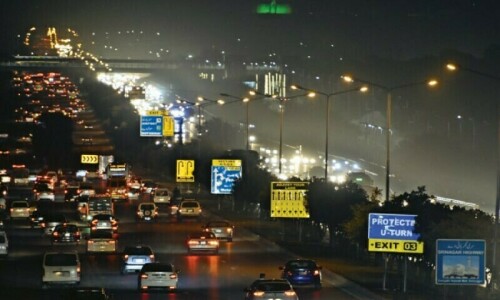ISLAMABAD: Emissions from the steel mills in the capital’s industrial area is polluting the air, residents breathe, and gradually destroying the environment.
Early each morning, the dense black and white smoke from these mills combines to become a grayish haze which hangs over sectors I-8, I-9 and I-10 and the areas across I.J. Principal Road, in Rawalpindi.
The smog hangs over these areas for a few hours each day. Residents are forced to breathe this polluted air and the stench of smoke is overpowering.
Pakistan Environmental Protection Agency (Pak-EPA) Director-General Dr Mohammad Khurshid told Dawn that last year, his agency began a campaign to stop the emissions from the steel mills but not much progress has been made.
“The Pak-EPA has been serving notices to these mills and their cases have been forwarded to the environmental tribunal. Beyond this, there is not much I can do,” he said.
But Dr Khurshid is not optimistic about the ability of the tribunal to stop the mills from damaging the environment. He said that the tribunal was only established last November.
“The tribunal is ineffective and violators of the environmental laws are aware of this. The tribunal can, at best, impose a Rs10,000 fine on the factories. This amount is pocket change for these giant businesses,” said Dr Mohammad Khurshid.
According to him, fining and arresting violators, on the spot are needed to effectively implement environmental laws.
“The weak enforcement of laws is the reason for environmentalists losing every battle against stone crushers, timber mafia, developers and steel mills because the laws are weak. The strongest instrument of the law is the power to arrest people and impound their machinery,” he said.
The Pak-EPA director general said the Environment Protection Act 1997 favoured the chambers of commerce and industry and the agency had suggested amendments to the law.
“Environmental violations must be made criminal offences,” he said.
Until the amendments to the law are approved, the Pak-EPA is trying to find ways to address the problem of air pollution on the basis of the existing law. The present Environment Protection Act 1997 includes a provision which allows the Pak-EPA to seek support from the local administration in making arrests.
Dr Khurshid said the Pak-EPA had also requested the climate change ministry to establish a regulatory authority like the PTA or Pepra to monitor environmental violations.
The Pak-EPA has issued warnings against the harmful effect of poisonous fumes to human health. Short-term exposure to toxic gases can cause the narrowing of airways and difficulty in breathing. The residents of these sectors are also pessimistic about the possibility of the quality of air they are breathing to improve.
“We are merely demanding justice. Is clean air and clean water too much to ask for,” said Suhail Agha, a resident of Sector I-9.
Published in Dawn, May 11th, 2015
On a mobile phone? Get the Dawn Mobile App: Apple Store | Google Play















































Dear visitor, the comments section is undergoing an overhaul and will return soon.